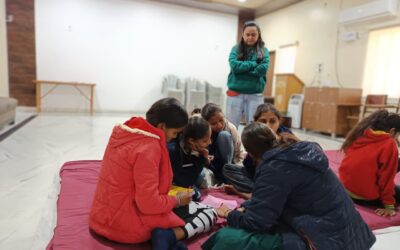Whenever we visit a new place or introduce someone to a new person, a routine often follows—one so ingrained in our social interactions that it goes unnoticed. Certain questions seem almost universal, popping up regardless of the city, town, or village we visit. It’s amusing how natural it feels, and we often don’t notice the significance of the questions we ask. After initial greetings, it’s common to ask people for their first name, last name, address, occupation, and sometimes even where they live.
While this seems like typical small talk, I once came across a conversation that didn’t follow this usual path. It took on a different tone altogether. A man and a woman were engaging in small talk. After a few minutes, the woman suddenly exclaimed,
“Oh, I’ve been talking to you so long, but I don’t even know your last name!” To this, the man seemed noticeably uncomfortable. He muttered a few surnames and asked the people around him. After some unusual and uncomfortable silence he finally said, “asking someone for their last name indicates you’re trying to know my caste.”
An Innocent Inquiry
While it may appear to be an innocent inquiry, it often holds deeper cultural significance. For many, a last name reveals more than just family identity. It can hint at a person’s caste, region, profession, and social status. This incident left me wondering how often we dismiss such questions without thinking twice. When, if ever, is it appropriate to ask, and how do we gauge someone’s intentions? Small talk often operates within our understanding of hierarchies related to status, class, caste, and power. What appears to be a casual part of daily life frequently reflects deeper power dynamics, hierarchies, and social structures in a setting.
Consider, for instance, the scenario of renting a house. It can reveal a great deal about these implicit biases. When a prospective tenant meets a landlord, small talk often follows a familiar pattern. There are questions about family, background, and occupation. These questions, however, might serve as a way to assess the tenant’s ‘suitability’, on the basis of markers that may seem trivial but actually reinforce social biases.
A Subtle Reminder
I remember that caste has always been a subtle reminder to how we operated even in childhood. It always confused me in my early age whenever my grandmother stopped me from playing with the neighbours’ kids. Because their last name was ‘below’ ours. The last name gamble was like walking on eggshells as there were restrictions towards many things in the name of caste and identity.
As I slowly anchored my understanding of the concept, I realized the distinguishing factors playing out in each sphere of life. The kitchen, where segregation of utensils is a reality so often seen in many houses whether they believed themselves to be casteist or not. In formal/informal situations, those from the upper caste expect those from the lower class to sit on the ground. In marriages, people can’t even think of getting married in upper caste households, and those who do are often ridiculed and shown their place in the caste hierarchies. But why do we do so naturally? Is it the muscle memory of everything bestowed upon us from our previous generations? How do we keep repeating the same rituals generation after generations?
Imagine a young woman from a Dalit community looking to rent an apartment in a predominantly upper-caste area. The landlord may subtly inquire about her last name, place of origin, or job. Each of these questions, though presented as harmless, maybe probing for information on her caste, socioeconomic status, and even lifestyle. If the landlord perceives her responses to fall outside his idea of suitable tenants, he may express concerns about how ‘she might not fit in’. Or suggest that ‘another place might be more suitable.’ This example sheds light on how small talk in the context of renting—usually an impersonal, transactional relationship—often masks implicit social biases.

Are Urban Areas Equally Inflicted?
In urban areas, where caste is often deemed irrelevant, many believe these biases persist in rural settings. But incidents like these show that caste-based perceptions are still very much alive in cities. However, they may be subtly woven into social interactions. Urbanites may deny their biases, often practicing them unconsciously in daily life while viewing villages as ‘backward’ or ‘communal’.
Caste has been prominent in India for over 3,000 years, profoundly influencing a person’s profession, social standing, social life, and marriage choices. While many consider these biases outdated, there are still strong, underlying ties between caste and identity. This emerges even in the most casual interactions. We see this through various historical examples where caste-based discrimination restricted people from reaching their full potential.
Take Karna from the Mahabharata, a legendary figure who serves as a classic example of caste-based injustice. Though a highly skilled warrior, Karna was denied the opportunity to compete in Draupadi’s swayamvar because of his status as a Suta Putra, and he was denied training by Dronacharya for not being a Kshatriya.
Karna’s struggles were not due to a lack of talent or skill but rather his caste, a barrier he could never fully overcome. His story has since come to symbolise the restrictive nature of caste-based hierarchies. It sets a precedent for viewing such injustices as ‘tragic but inevitable’. This narrative, in turn, normalises modern incidents of tragedy among inter-caste couples and even, in extreme cases, the horror of honour killings.
Another deeply embedded aspect of caste complexity is the expectation of fulfilling caste-based occupations. In some cases, people feel a sense of duty to continue the traditional jobs associated with their caste, even when external societal pressures are minimal. For example, members of the Valmiki community are often found working in sanitation, including the collection and cleaning of human excrement. Similarly, people from the Chamar community might still work as cobblers.
A Sense Of Duty
This sense of duty often transcends individual choice, rooted in a collective cultural memory of caste-based roles. For those involved, this duty may bring a suppressed yet persistent identity struggle. This is between personal aspirations and the ‘responsibility’ to uphold traditional caste occupations. This kind of small talk may not be overtly offensive, but it underscores an implicit need to gauge others’ backgrounds, fitting them into preconceived categories. In such moments, small talk becomes a tool for evaluating social proximity, status, and perceived ‘suitability’ within a network of shared, often unspoken hierarchies.
In essence, small talk which may seem trivial and innocuous, often operates through a complex matrix of caste, class, and power dynamics. It reflects deeply ingrained social structures that have subtly persisted despite the country’s modernization and urbanisation. These are interactions that reinforce caste boundaries and hierarchical social structures. They highlight how something as simple as asking someone’s last name can reflect a deeper mis/understanding of who they are.
In our day-to-day lives, the questions we ask can reveal far more than just curiosity. They reflect an entire system of expectations, assumptions, and biases normalized over centuries. So the next time you engage in seemingly casual small talk, pause for a moment. Consider what those questions may imply and what they reveal about your own beliefs and biases. Small talk may appear insignificant, but it has the potential to reflect and even reinforce the societal boundaries we live within. It offers a window into how deeply social structures shape our interactions.




0 Comments